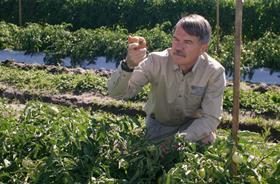
A University of Florida (UF) tomato expert has called on researchers worldwide to use genetics to help farmers grow tastier tomatoes in many geographic locations.
Consumers crave tasty tomatoes, but the trick comes in growing flavourful fruit in different environments, said UF professor emeritus Jay Scott.
“I am proposing a worldwide approach involving public and private breeding programs that one day might make dissatisfaction with tomato flavour obsolete,” said Scott, who gave a presentation at the Tomato Breeders Roundtable and Tomato Disease Workshop in November in Clearwater, Florida.
In a recent follow-up interview, Scott recommended scientists use genetic markers – genes that are tightly associated with various traits – to efficiently breed tomatoes that are more likely to appeal to consumers’ taste buds. Furthermore, researchers must develop more flavourful fruit in various types of soil and weather conditions, he said.
According to Scott, weather and other conditions constitute 'different environments' – specifically, various soils, irrigation, rain, fertilisation programs and temperature, among other factors.
For example, a tomato that tastes good in Florida may taste even better if grown in Mississippi because Florida’s soils are not as good as those in Mississippi, he explained.
“There’s a huge environmental effect on flavour in tomatoes,” Scott said. “You may not get the same flavour in different places. The big trick is to get an environmentally stable good flavour.”
Scott has spent more than 30 years as a tomato breeder at the UF/IFAS Gulf Coast Research and Education Center in Balm, Florida, east of Tampa, during which time he has released many different tomato varieties.
“We should test material around the world,” he said. “This approach would involve a whole bunch of people. Everybody’s input would be helpful. Plus, I like the international cooperation aspect.”
At UF/IFAS, assistant professor Sam Hutton is developing several flavourful tomato varieties. Other scientists around the world are developing similar types of tomatoes.
Scott has encouraged them to share seeds of those new types of tomatoes to grow and taste in their fields and labs, allowing scientists to find out if, for example, tomatoes developed in California taste good in Asia, Africa or South America.
“Here’s the thing: When people go to the grocery store, they’re not necessarily going there with the goal of buying the tastiest tomatoes,” Scott said. “They go to the store and buy tomatoes, thinking, ‘I’m making a salad tonight or I’m making tacos tonight.’ Commercial tomatoes get a bad rap because people compare them to home garden tomatoes that don’t have to be packed and shipped. We want to change that perception.
“In my career, there has been a dissatisfaction among consumers with the flavour of commercial tomatoes,” Scott outlined. “We’re trying to make it so that in the future, people think, ‘tomatoes taste good’ and wonder why there used to be dissatisfaction with them.
“I have long had a hypothesis that if I could develop a tomato variety with flavour that everyone liked, then all the problems in the world would be resolved,' he added. 'Although this might sound absurd, there is still no evidence against the hypothesis because there are always some that don’t like the flavour. If the proposed research is carried out, then I would keep the hypothesis but change the ‘I’ to ‘we.’'



